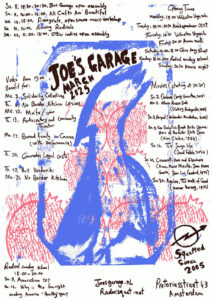The Dutch government recently passed a new law, Wet Handhaving Kraakverbod (or law to Enforce the Squatting Ban), with the aim of evicting squatters more quickly. There is a lot of confusion and uncertainty about what exactly this law will entail and especially what influence this will have on squatters and their housing rights.
Unfortunately, this text will not be able to answer all questions since this law has been written by politicians who see squatting as a terrible thing and want to get rid of it, without actually seeming to have much understanding of the legal protocols and procedures. The result is a law that says that from now on, squatters must be evacuated more quickly without clearly establishing exactly how this should work. Both the Public Prosecution Service, the Council of Judiciary and Bond of Lawyers strongly criticised the proposal and called for this law not to be adopted, nevertheless a large majority voted in favour and this law entered into effect on 19 May, 2021.
What Does this Law Entail?
This law changes the procedure to be followed in the event of a criminal eviction, with the stated aim of speeding up this process.
It is important to note that there are 3 ways a squat can be evicted:
1. An emergency evacuation (spoedontruiming): this is done by order of the mayor, usually shortly after a building has been squatted. There are a number of legal grounds by which this type of eviction can be carried out. Unfortunately, emergency evictions also happen when none of the legal grounds are met.
2. Criminal proceedings: this is when the Public Prosecutor (Officier van Justitie) decides to proceed with an eviction.
3. A civil procedure: this is when the owner starts a lawsuit in the hope of securing an eviction through the courts.
The Squatting Ban Enforcement Act therefore only applies to option 2, criminal proceedings. The other two options can, and mostly likely will, continue to occur.
How Did Criminal Proceedings Play Out?
Criminal proceedings begin when the Public Prosecutor wants to evict a squat. This process often begins after an owner has filed charges against the squatters, and claims to have plans for the property, but there may also be other motivations such as public disturbances, convenient connections between the owner and the municipality, or simply a no tolerance policy by a municipality.
The Letter
The prosecutor must notify the squatters of the plans to evict by letter, and tell them that the eviction will take place between 2 and 8 weeks after the letter is sent. The squatters then have a week to file a counter lawsuit to challenge these plans.
When squatters file a lawsuit, the court date will usually be scheduled within the 2-8 weeks stated in the letter from the prosecutor, on average within 3-4 weeks.
The Court Case
Losing a court case is expensive, and the chances of squatters to win is very low. For this reason, planned court cases are often withdrawn in the last moment. This way, squatters know until when they can enjoy their house safely without cops coming to evict the place.
The length of time it takes, between delivering the initial letter from the prosecutor to the moment the squatters are evicted, has been the main argument in the political debate to get the new bill through. The initiators have successfully managed to distort the truth and have convinced a majority of their fellow politicians that squatters now have at least 8 weeks of luxury and freedom to destroy buildings while poor property owners have to stand by and watch helplessly.
Criminal Proceedings Under the New Law
To end this great injustice, they invented the following:
If a public prosecutor wants to have a squat evicted, he submits a request to a Judge Commissioner (Rechter Commissaris, or RC). The RC must make a decision within three days whether this request is well-founded and whether evacuation is allowed. Before reaching this decision, the squatters should be given an opportunity to be heard, if possible. If the RC agrees, the Public Prosecutor can immediately proceed to evict. If the squatters want to appeal against the decision, this is of course possible, but the eviction will still take place.
Seriously? How? Huh?
This description raises several questions that are difficult to answer, such as: Seriously? How? or Huh?
The Three Day Period
First of all, the period of 3 days: This period does not start from the moment that a building is squatted, but from the moment that the Public Prosecutor submits a request to the Judge Commissioner. For this, the Public Prosecutor must first have taken the time to prepare a case and compile a file. How much time the Public Prosector needs for this will differ per building/situation, and per Public Prosecutor.
What is a Judge Commissioner (Rechter Commissaris)?
The RC is a type of judge that usually deals with matters such as a search warrants, wiretapping someone’s phone, extending someone’s pretrial detention period, and hearing witnesses.
The function of an RC is to supervise the progress and legality of the work of the Public Prosecutor.
The Right to be Heard…If Possible!?
This is perhaps the most unclear and worrying point about this law. It is not described how an RC should approach squatters to give them the opportunity to tell their side of the story. Within the three day period, it is highly doubtful squatters will still be given sufficient opportunity to adequately defend their house peace.
Appeals
The point of being able to appeal has always been the case, and it never results in a situation where the property owner suddenly has to provide the squatters access to the building again. However, a positive ruling can have advantages for future squatters court cases.
Legal Costs
A somewhat positive point about this new law, is that for these procedures no legal costs are charged to the squatter. A squatter also still has the right to a lawyer for the interrogation by the RC.
What Can Squatters Do?
As squatters, we should prepare as well as possible so that we have our story ready as soon as we are called upon by the RC.
There is also a chance we can challenge this law on a legal front, however, the extent to which this law can be challenged legally can only be determined once we know how it works in practice. As soon as squatters can demonstrate that they have not, or have insufficiently been given the opportunity to defend their house peace, and especially if this continues to be done systematically, legal arguments can be found for challenging this law.
Until then, again:
Law or no law… squatter’s gotta squat!!!



